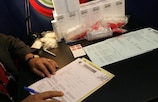EURO medical plans on target
Friday, April 8, 2016
Article summary
UEFA's comprehensive medical programme and anti-doping operations at UEFA EURO 2016 in France are being finalised, and will include a dedicated Elite Injury Study to assess injuries at the tournament.
Article top media content

Article body
Preparations for UEFA's medical programme and anti-doping operations at UEFA EURO 2016 are well on target, the UEFA Medical Committee learned at its latest meeting in Nyon.
The French national anti-doping organisation AFLD's laboratory at Chatenay-Malabry, around 10km from Paris, has been confirmed as the tournament laboratory, with all in-competition samples analysed there. A cooperation agreement with the AFLD was signed in February, and a further agreement covering analytical services at the Chatenay-Malabry laboratory rubber-stamped in March.
UEFA now has agreements in place with 23 national anti-doping organisations to facilitate cooperation and knowledge-sharing. In that spirit, UEFA and several NADOs cooperated fully as out-of-competition testing ahead of UEFA EURO 2016 kicked off in March, with over 150 tests carried out by UEFA and NADOs.
UEFA Medical Committee chairman Dr Michel D'Hooghe said: "EURO 2016 will see the further evolution of UEFA's anti-doping campaign. This includes the introduction of the haematological module of the biological passport, extensive out-of-competition testing, in-competition tests at every match and targeted testing based on intelligence and knowledge-sharing. I'm very happy with the strengthened collaboration with the national anti-doping agencies, which will lead to an even more efficient anti-doping programme for European football."
Dr D'Hooghe also expressed his satisfaction with the progress so far of the UEFA medical programme for the EURO final tournament in France. "The medical infrastructure and medical staffing are very important for such a major competition," he said. "We will have the very best medical programme and staff in place, with a network of French Football Federation doctors supporting the teams at their base camps, transfer hotels and stadiums."
A dedicated Elite Injury Study will also be conducted during UEFA EURO 2016. The study will aim to assess the risk, pattern and severity of injuries at the finals. It will improve understanding of injuries by spreading the data and knowledge obtained from the study to the wider football family.
The UEFA Elite Club Injury Study is now in its 15th year, and will be the subject of a special edition of the British Journal of Sports Medicine in June. The Elite Club Injury Study annual meeting takes place in Lisbon on 1 June.
The Medical Committee approved a proposal for a new part of the Injury Study which would correlate performance data – collected on a team basis and on individual players – with injury data, and approved the creation of a working group composed of scientists, coaches, and other football experts, in order to agree on the most effective use of the data.





